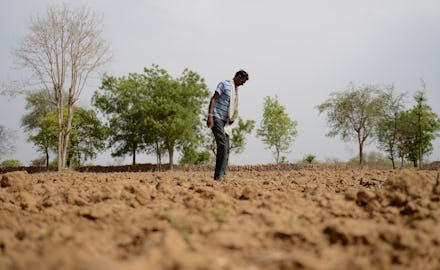Climate Change Is Already Disrupting 92,000 People's Lives

There's still a shocking number of people who don't believe man-made climate change is real, but there are 92,000 people who will tell you they've experienced its consequences firsthand. Now a team of researchers is using their observations to add real human anecdotes to the growing body of evidence demonstrating climate change is real.
An analysis recently published in the journal Nature Climate Change examined hundreds of previously published studies. Researchers combined observations from 92,000 people spread across 137 countries who rely on farming, hunting and gathering for their survival and livelihood.
They found that 70% of the populations saw changes in temperature, rainfall and weather patterns, all of which affect major elements of their livelihood. You can see some of the major changes on the map below:
Climate change is affecting their ability to grow food and raise animals.
"Secondary impacts of climatic changes on both wild and domesticated plants and animals are extensive and threaten the food security of subsistence-oriented communities," the researchers wrote.
The human observations fall in line with the climate data that has been collected with scientific instruments, according to the study.
The effects seem to be worse in regions in the Pacific Islands, Central Africa and the North American Arctic. In some cases, these people aren't just noticing changes in the weather and their food supply. They're already having to change their behavior to adapt to an unpredictable climate.
"Fine-scale environmental changes have enormous consequences for local communities as they not only disrupt crop calendars, destroy harvests and trigger soil erosion, but can increase conflict over limited resources and enhance risk to vulnerable members of society," the researchers wrote.
For example, the researchers found many people are eating less and walking farther to find water or suitable land for their herds. In Sweden, Sami herders are being forced to abandon the practice due to changes in temperature and disappearing ice cover. In the Arctic, it's becoming harder to learn and practice traditional kinds of harvesting because the weather is too unpredictable now. In Iran, climate changes are widening the gap between rich and poor farmers.
This is the most comprehensive look yet at how climate change is already disrupting people's lives, and the researchers hope it will give us another way to think about the potential consequences.
"We think about climate change as something that you graph or something that happens in the Arctic, but these are the experiences of real people seeing changes firsthand," Valentina Savo, lead author on the study, told the Vancouver Sun. "It's not theoretical. When the timing changes about when to plant and harvest, where rainfall is now concentrated and intense, it's very disruptive."